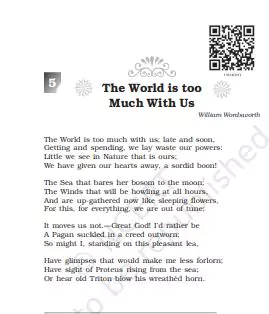‘NCERT Solutions for Class 11 English Chapter 5 The World is too Much With Us‘ PDF Quick download link is given at the bottom of this article. You can see the PDF demo, size of the PDF, page numbers, and direct download Free PDF of ‘Ncert Class 11 English Chapter 5 Exercise Solution’ using the download button.
The World is too Much With Us PDF Free Download

Chapter 5: The World is too Much With Us
The World is too much with us; late and soon,
Getting and spending, we lay waste our powers:
Little we see in Nature that is ours;
We have given our hearts away, a sordid boon!
The Sea that bares her bosom to the moon;
The Winds that will be howling at all hours,
And are up-gathered now like sleeping flowers,
For this, for everything, we are out of tune;
It moves us not.—Great God! I’d rather be
A Pagan suckled in a creed outworn;
So might I, standing on this pleasant lea,
Have glimpses that would make me less forlorn;
Have sight of Proteus rising from the sea;
Or hear old Triton blow his wreathèd horn.
| Author | NCERT |
| Language | English |
| No. of Pages | 2 |
| PDF Size | 12 MB |
| Category | English |
| Source/Credits | ncert.nic.in |
NCERT Solutions Class 11 English Chapter 5 The World is too Much With Us
1. Why does the poet prefer to be a primitive Pagan rather than a member of civilised society?
Answer:
The poet is disturbed by the consumerism and materialism which is brought to us by industrialisation. The world is bound with humanity where the people are busy “getting and spending”. He conveys that humanity has wonderful powers which are being laid waste. The heart of mankind is given away to this blessing which is destructive, called a ‘sordid boon’, an oxymoron. The poet decides to become a Pagan and prays to God. People of South Europe who were called Pagans were rural folks or rustics, were not worshippers of monotheistic God.
The poet admires the tradition of the Pagans and perceives that being close to nature is one among them. He aspires to feed on and relish the admirable beauty of nature. He wishes to enjoy the lea by standing on it so that his feeling of loneliness would reduce.
He plans to have glimpses of the countryside and taste the rustic and rural life that the Pagans live. He wants to go back in time so that he might see “The Old Man of the Sea”, Proteus which rises from the sea. He also wants to see “The Messenger of the Sea”, Triton who is the son of Poseidon. The poet wishes to be in harmony with nature.
2. What, according to the poet, are human beings out of tune with?
Answer:
The poet always wished to be close to nature. Whether in his The Tables Turned or Tintern Abbey, he has described the beauty of nature. His “The World is too Much With Us” explains the criticism of humanity which is distanced from nature. The materialistic reliance of “getting and spending” that industrialization has brought to us, the poet refers to it as a “sordid boon”, which is a contradiction. Wordsworth talks about the past and future worlds, “late and soon”.
He is not happy as mankind has given their heart to this destructive blessing. This industrial revolution is considered as a boon, but the poet condemns it deeply. We don’t see “the nature that is ours”. The poet appreciates the beauty of nature. He explains “The sea that bares her bosom to the moon”.
The attractiveness of the light reflected waters which are mirthful appears to be magnificent. The poet talks about the wild wind which gathers above the sleeping flowers. However, he explains the loss and suffering due to mechanical advancement which occurs in our society. The poet mourns how humanity is ‘out of tune’ and aspires to become a Pagan to get glimpses of nature’s beauty.
NCERT Class 11 English Textbook Chapter 5 With Answer PDF Free Download
